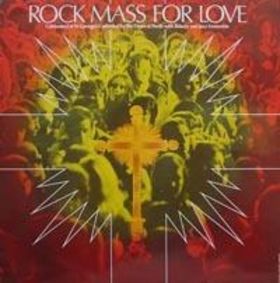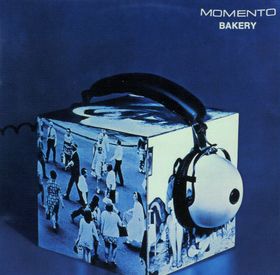Rock Mass For Love (Astor ALPS-1032)

(no details available)
| MILESAGO: Australasian Music & Popular Culture 1964-1975 | Groups & Solo Artists |
BAKERY
Perth / east coast 1970-1975
Rex Bullen (keyboards) 1971-72
Tom Davidson (vocals) 1971
Hank Davis (drums) 1970-72
Paul Ewing (organ, vocals) 1972-75
Steve Hogg (bass, vocals) 1972-73
Phil Lawson (bass) Feb-Aug. 1973
Barry Leef (lead vocals) 1973-75
Mal Logan (keyboards) Jun. - Oct. 1970
Eddie McDonald (bass) 1970-72
Jackie Orszaczky (bass) Aug. 1973 - 1975
Mark Verschuer (vocals) 1971-73
Peter Walker (guitar) 1970-75
John Worrall (vocals, flute) 1970-72
History
Bakery was formed in Perth at the start of 1970. Regarded as one of the leading "underground" groups of their day, they are remembered for their superb debut album Momento, the innovative Rock Mass for Love LP and the powerful single "No Dying In The Dark".
The original lineup was John Worrall, "wild-haired guitarist" Peter Walker (ex-Jelly Roll Bakers), Mal Logan (ex-The Rebels), Eddie McDonald and Hank Davis. McDonald and Davis were both ex-members of the NZ Avengers.
In the words of encyclopedist Vernon Joyson, Bakery's work:
"... blended hard rock and country with jazz using complex arrangements. Their main strength was the variety of their music which could switch from gentle acoustic passages to booming heavy progressive assaults on the senses within the same song."
Bakery released only two singles, but both were impressive heavy rock efforts. The first, released on the RCA label, was "Bloodsucker" / "Leave Scruffy Alone" (February 1971). By the time they released their second single in July 1971, Bakery had signed with the Melbourne-based Astor label, who issued "No Dying in the Dark'" / "Trust in the Lord".
Both singles displayed the band's main stylistic influences, primarily the new wave of "heavy" bands spearheaded by British groups Black Sabbath, Led Zeppelin and Deep Purple. "Bloodsucker" was in fact a Deep Purple cover, sourced from their In Rock LP. "No Dying in the Dark" was very successful in Perth, peaking at #9 on the local chart, and it's the track for which they are now best remembered.
The B-side of the single was a track from their Rock Mass For Love LP. This unusual project was a significant thematic departure from Bakery's usual progressive/hard rock style. Recorded live at a mass at St George's Cathedral, Perth on 21 March 1971, it was one of the first Australian musical musical works of its kind, preceding the first Australian production of Jesus Christ Superstar by almost a year.
Rock Mass For Love tapped into the current interest in what became known as "God Rock" or "Jesus Rock", in which composers sought to communicate the Christian message to young people by setting religious-oriented lyrics in rock or pop music arangements. In large measure, this movement was a direct reaction to the calamitous fall in church attendances that had begun in the Sixties, and the concurrent massive upsurge in the popularity of rock and pop music. Little is known at this stage about how the Bakery album came to be recorded, but we hope to be able to add more to this part of the story in the future.
The beginnings of the "Jesus Rock" genre can be traced back to the folk movement of the early Sixties. In 1963 "The Singing Nun", Sister Luc-Dominique (Jeanine Deckers) released a folksy single called "Dominique", which extolled the virtues of St Dominic, founder of the Dominican order. Sung in English and French, "Dominique" became the surprise international hit of the year and famously kept The Kingsmen's classic "Louie Louie" out of the #1 spot on the US charts. "Jesus Rock" came to the forefront of popular attention around 1970 with the release of the original LP version of Tim Rice and Andrew Lloyd Webber's Jesus Christ Superstar. The album was a huge success and stage productions were soon playing to packed houses in major cities; JCS also spawned imitators like the successful American musical Godspell and the Australian production Man Of Sorrows. In Australia, one of the pioneers of this genre was Adelaide nun and music teacher Sister Janet Mead, who staged a number of "pop mass" events in Adelaide in the early Seventies and scored a massive international hit in 1974 with her million-selling pop arrangement of "The Lord's Prayer".
Bakery, meanwhile, was undergoing its first round of lineup changes. By mid-1971, both Worrall and Logan had departed, with Worrall briefly joining Ssarb before forming Fatty Lumpkin in 1972. They were replaced by Tom Davidson (vocals) and Rex Bullen (keyboards); Bullen had been a member of '60s Canberra beat group The Bitter Lemons.
Rock Mass for Love was issued in August 1971, narrowly missing the national Top 20, and it was also issued in the USA on the Decca label. After the LP came out, Mark Verschuer (ex-Barrelhouse) replaced Davidson on vocals. Verschuer sang lead vocals on their fantastic second album, the studio LP Momento released a year later in August 1972. Ian McFarlane lauds it as "a fine example of European-influenced, heavy progressive rock" and Vernon Joyson reserves particular praise for the track "The Gift", written by Peter Walker, which he describes as "an eight-minute barrage of bombastic riffs, arse-kicking solos and swirling Hammond organ in the mould of acts like Deep Purple and Leaf Hound". Regrettably, like most of Astor's locally-recorded output, neither of the Bakery albums has ever been officially reissed on CD, which is a great shame, as Momento certainly ranks as one of the strongest and most accomplished Australian rock albums of the period.
Line-up changes continued into 1972, with Steve Hogg (bass, vocals; ex-Juke, King Biscuit Company, Nostra Damus) and Paul Ewing (organ, vocals) replacing McDonald and Bullen respectively; Verschuer also left, with Davis, Walker, Hogg and Ewing sharing vocal duties. Bullen moved on to Natural Gas before reuniting with John Worrall in Fatty Lumpkin.
This four-piece version of Bakery is probably the best remembered incarnation of the group for fans in the eastern states. They gigged consistently, gaining a strong following on the east coast festival/concert circuit, playing alongside the other leading acts of the day like Billy Thorpe & The Aztecs, MacKenzie Theory, Chain, Carson, Madder Lake and Sid Rumpo. Bakery performed at the second Sunbury Festival in January 1973 and their live version of the jazz-tinged "Living with a Memory" (a track from Momento) was included on Mushroom's debut triple album set The Great Australian Rock Festival Sunbury 1973, released in April 1973.
In February 1973, just after their Sunbury appearance, Phil Lawson (bass) replaced Steve Hogg and renowned New Zealand-born vocalist Barry Leef (ex-Simple Image, Hunger) joined as lead singer. In August, (the late) Jackie Orszaczky (ex-Syrius) replaced Lawson on bass. When Frank Zappa toured Australia for the first time during June 1973, he spotted Leef fronting the band at Chequers in Sydney -- Bakery regularly played a cover of Zappa's "Road Ladies" in their live set at this time -- and FZ was so impressed with Barry's vocal talents that he invited him to audition for the Mothers. Barry performed as a guest vocalist on "Road Ladies" at two of Zappa's Hordern Pavilion concerts, but sadly, contractual problems prevented him from taking up FZ's invitation to join The Mothers in the USA, and he reluctantly had to turn down the offer of a lifetime.
Bakery continued gigging until their split in February 1975, but regrettably they made no more commercial recordings.
After Bakery ...
Paul Ewing went on to play with Melbourne band Rock Steady in the late '70s, Perth band JETS in the early '80s and The Troupadores in late '90's; he still does occasional solo and duo gigs in Geelong and Melbourne.Perth indie band Fourstroke recently covered "No Dying In The Dark", and their version of this classic track can be found on a CD-EP released by Perth label Out Of The Loop.
Discography
Singles
Feb. 1971
"Bloodsucker" / "Leave Scruffy Alone" (RCA 101916)
Jul. 1971
"No Dying in the Dark" / "Trust in the Lord" (Astor A-7204)
Albums
Aug. 1971
Rock Mass For Love
(Astor ALPS-1032)

(no details available)
1972
Momento
(Astor ALPS-1035)

Side 1:
1. "Holocaust" 9:24
2. "Pete for Jennie" 1:30
3. "Living With a Memory" 8:52
Side 2:
1. "S.S. Bounce" 4:19
2. "The Gift" 7:59
3. "When I'm Feeling" 2:19
4. "Faith to Sing a Song" 7:25
Other Recordings
Apr. 1973
The Great Australian Rock Festival: Sunbury 1973
(Mushroom)
Various artists live recording, includes one Bakery track, "Living With
A Memory"
1994
Golden Miles: Australian Progressive Rock 1969-1974
(Raven Records)
This essential 2CD compilation includes the classic Bakery track "No
Dying In The Dark"
References / Links
Many thanks to Paul Ewing for kindly providing the press clippings featured in this article, and for additional information and corrections.
Ian McFarlane
Encyclopedia of Australian Rock & Pop (Allen
& Unwin, 1999)
Vernon Joyson
Dreams, Fantasies & Nightmares - Australia /
NZ (Borderline Books, 1995)
Noel McGrath
Australian Encyclopedia of Rock (Outback Press,
1978)
Chris Spencer Zbig Nowara
& Paul McHenry
Who's Who Of Australian Rock (5th edition) (Five
Mile Press, 2002)
I94bar.com
http://www.i94bar.com/newspage.html
Rate Your Music - Bakery
http://rateyourmusic.com/artist/bakery